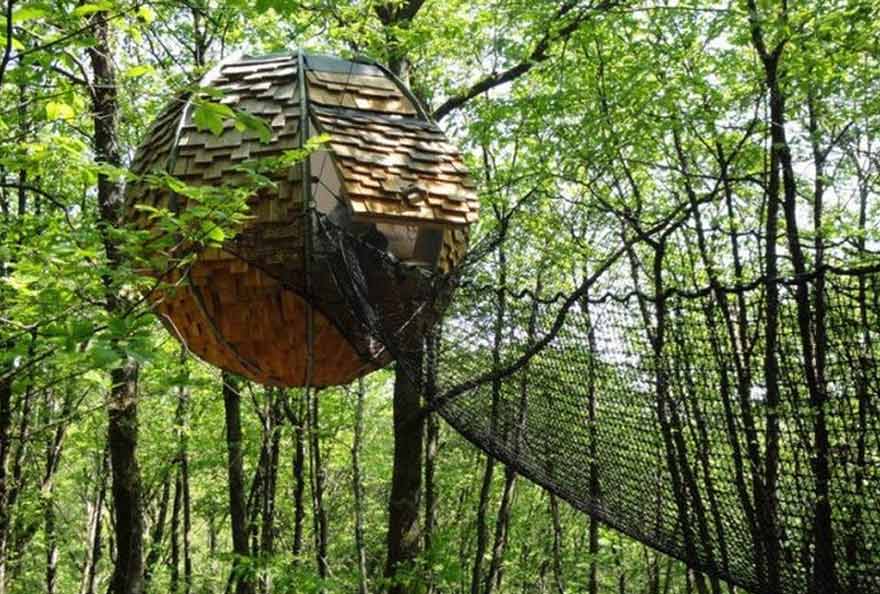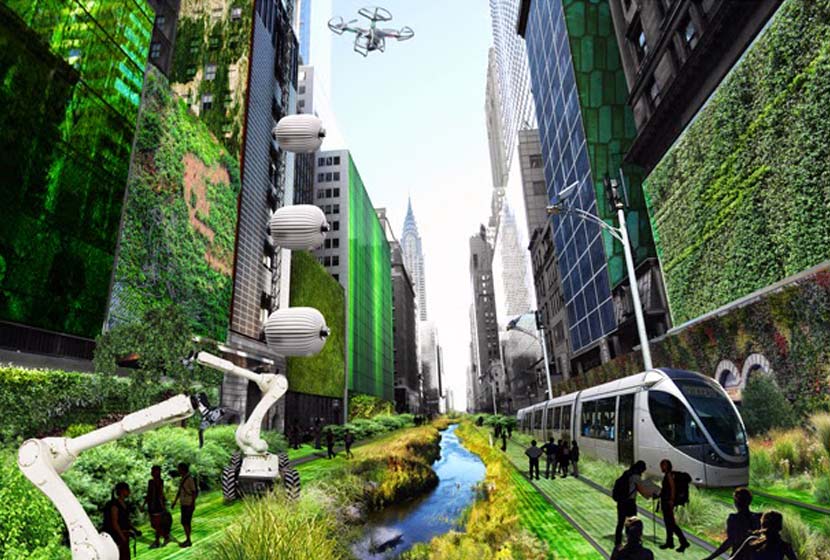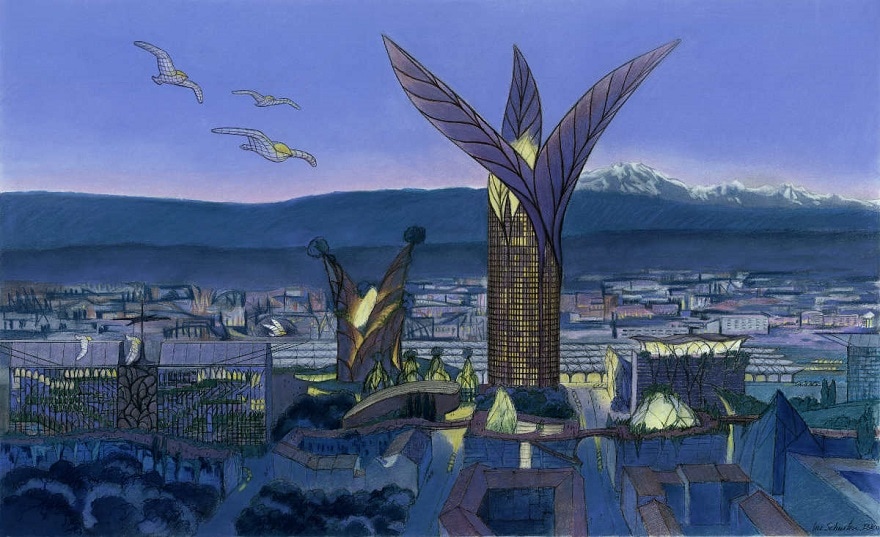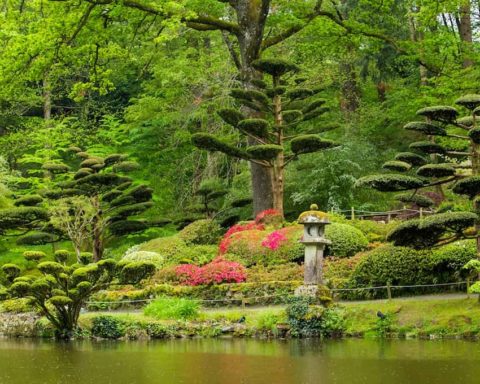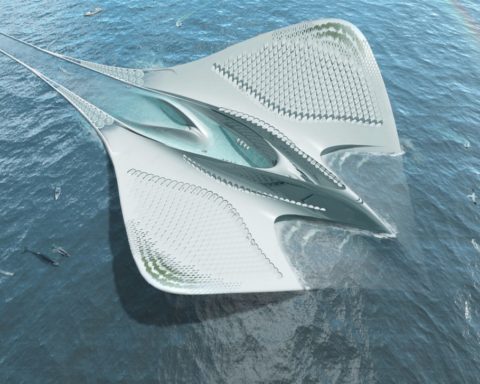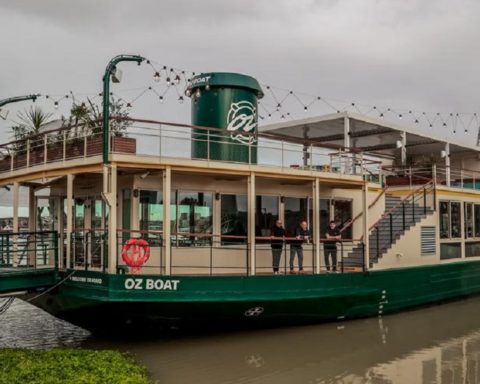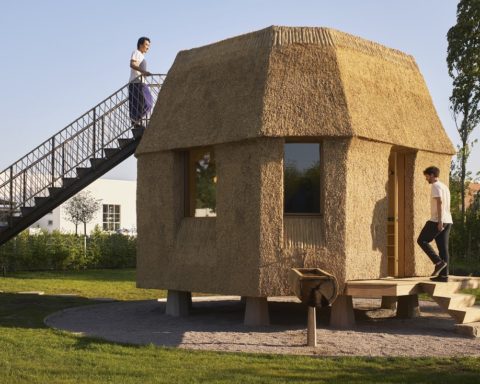Is building an eco-friendly house part of a fashion trend or is it a response to a real questioning of our relationship with the world, our environment and others? Are we heading towards a new form of housing for tomorrow? Closer to the concerns of energy saving, of economy in short, in the face of the difficulties and uncertainties of today's world? Bioclimatic designs, standards BEPOS, label Effinergie+... there are many legislations and incentives to build green. But what do the French think about it today?
Photo: hanging nest in Morbihan (56)
A on the occasion of the Jorld Architecture Awards on 5 October, which each year, starting with a theme for reflection, strives to draw the attention of professionals and the public to development issues concerning our cities and the human habitat in general, the site of matching geographical affinity, "JeReveduneMaison.com", reveals the vision and feelings of the French people. (1) on the three major themes around the concept of eco-responsible housing: architecture, construction and climate. For one out of two French people, a house must be in harmony with the environment. 79% of French people are concerned about the impact of their house on the climate and 62% are willing to pay more. Nunéro one of the regions: Brittany!

Environment before beauty or practicality
The French priorities in terms of habitat seem to have changed. Indeed, 54% consider that a house must above all be in harmony with the environment and meet ecological requirements. Those who prefer sumptuous and comfortable buildings are now only 27%, just ahead of those for whom the house must just be practical and functional (19%).
|
Ranking
|
According to you, a house should first and foremost be:
|
Percentage
|
|
N°1
|
In harmony with the environment and ecological
|
54%
|
|
N°2
|
Beautiful, large and comfortable
|
27%
|
|
N°3
|
Practical, functional, no frills
|
19%
|
The choice of finishes and purely aesthetic considerations in the construction of a house can be much more decisive on its price than its ecological and thermal quality. Choosing high-end finishes eliminates the price differences between conventional and ecological ones. There are two reasons for this.
On the one hand because on the ecological versions, some choices are closer to the top of the range than to the middle of the range; switching from one to the other is therefore proportionally less expensive.
Second, because the finishing touches can be very expensive. Thus, a conventional house with choices of high-end finishes is more expensive than a normal ecological house, while the extra cost of the finishes has changed absolutely nothing in their performance. There is therefore a choice to be made between "being" and "appearing".

Simon Dale's eco-friendly house in Wales ©bioalaune.com
79% of French people think about the impact of their homes on the climate
Whether in their research or in their final choice, the French are particularly concerned about the impact the house can have on the climate. More than 79% say they are thinking about it, compared to 21% who are not at all concerned.
|
Ranking
|
When looking for or buying a home, think about the impact it will have onthe climate (e.g. reduction of greenhouse gasesgreenhouse effect)?
|
Percentage
|
|
N°1
|
Yes
|
79%
|
|
N°2
|
No
|
21%
|

Ecology is not a question of price!
If the French are willing to make efforts to reduce their impact on the climate, they are even willing to pay the price! Thus, more than 62% declare themselves ready to pay more for a house built in an eco-responsible way. The remaining 38% consider that the price of real estate is already high enough not to add to it.
|
Ranking
|
Are you willing to pay more for a eco-friendly house?
|
Percentage
|
|
N°1
|
Yes, it's important!
|
62%
|
|
N°2
|
No, the houses are expensive enough
|
38%
|
As to how much more the French are willing to pay, 54% say they are willing to increase their costs by 2 to 5%. 27% will go up to 1% more and 18% for more than 5% extra cost.
|
Ranking
|
If so, what extra cost would you be willing topay?
|
Percentage
|
|
N°1
|
Between 2 and 5% more
|
54%
|
|
N°2
|
Up to 1% more
|
27%
|
|
N°3
|
More than 5%
|
18%
|
A very precise economic comparison of ecological houses vs. conventional houses has been published at fiabitat.com by Ugo Degrigny, his co-founder: a site dedicated to the energy performance of buildings, where publications are grouped by thematic dossiers and cover all subjects related to passive and ecological construction and energy renovation. Their conclusion was that additional costs are often higher for ecological construction, which can be explained by the necessary preliminary reflection work: if you want to build efficiently, you can't improvise. Green" building should not be calculated in terms of "extra costs", but in terms of investment, because the performance of the houses is not at all equivalent and this higher cost pays for itself in the medium and long term.
The difference in costs between the conventional house and the ecological house is due to two things: the durability of materials and the technical choices of implementation.
The conventional version uses many components that are high performance, but not very durable and cannot be repaired. At the end of their life, they must be discarded and replaced completely. This is the case with plastic windows and double glazing, for example.
Technical choices are also of capital importance in the long term: for example, choosing to use materials for insulation that need to be protected with a completely sealed vapour barrier is not a bad idea if you want to maintain performance over a long period of time, as the very use of the site will tend to degrade the properties of this assembly. In ecological construction, the technical choices are no longer made in relation to the industrial or commercial ease of distribution of the product, but in relation to its performance and durability once in place, even if the installation takes a little longer (which is not necessarily the case anyway).
Where should we work for the climate?
On this question, the French are divided: the majority of 48% believe that it is the towns and cities that must work in this direction, those in 44% believe that it is up to the towns and cities to make the effort, and the 8% opt more for the villages.
|
Ranking
|
In your opinion, what environments should do the most for the climate?
|
Percentage
|
|
N°1
|
Agglomerations
|
48%
|
|
N°2
|
Cities
|
44%
|
|
N°3
|
The villages
|
8%
|
Who has to work in this way?
As far as the actors of this climate awareness are concerned, the French think that manufacturers are the first to have to act at 35%. They are followed by the State at 30%, then architects at 22%, buyers at 11% and portals and estate agents at 2%.
|
Ranking
|
Which actors shouldget more involved in this?
|
Percentage
|
|
N°1
|
Builders
|
35%
|
|
N°2
|
The state
|
30%
|
|
N°3
|
Architects
|
22%
|
|
N°4
|
Buyers
|
11%
|
|
N°5
|
Portals and real estate agents
|
2%
|
Nevertheless, without waiting for solutions to come "from others", more and more French people are opting for individual ecological solutions in their homes: installation of small wind turbines in the garden or photovoltaic panels on the roof, rainwater harvesting, construction on stilts, lime plastered walls, wooden foundations, refrigerator powered by the cold of the foundations, wood wool for acoustics, and so on And others have moved up a gear by living in a house entirely designed on multiple ecological concepts.

Situated on the outskirts of a village in Charente-Maritime, this house is atypical for its compact shape known as "eco-shell", its sanitary qualities and its low ecological footprint, both for its construction and its operation.
Mapping of areas sensitive to eco-responsible housing
"JeReveduneMaison.com has also analysed more than a million houses throughout France according to criteria and keywords specific to the "eco-responsible" nature of the properties: These include "low consumption", "BBC", "bioclimatic", "ecological", "geothermal", "passive house", "solar panels" and "heat pump".
This analysis allows for a ranking of regions based on two criteria: the regions with the highest number of green homes and the percentage of green homes in each region compared to the number of conventional homes.
A stronger presence of ecological houses in Brittany : With 4% of ecological houses, Brittany is at the top of the ranking, just ahead of Alsace and Pays de la Loire.
On the other hand, Picardy, the Provence-Alpes-Côte d'Azur region and Nord-Pas-de-Calais are in last position with only 1% of ecological houses.
|
Ranking
|
Regions
|
Percentage of green homes
|
|
N°1
|
Brittany
|
4%
|
|
N°2
|
Alsace
|
4%
|
|
N°3
|
Pays de la Loire
|
4%
|
|
N°4
|
Franche-Comté
|
3%
|
|
N°5
|
Rhône-Alpes
|
3%
|
|
N°6
|
Centre
|
3%
|
|
N°7
|
Lorraine
|
2%
|
|
N°8
|
Poitou-Charentes
|
2%
|
|
N°9
|
Midi-Pyrénées
|
2%
|
|
N°10
|
Haute-Normandie
|
2%
|
|
N°11
|
Bourgogne
|
2%
|
|
N°12
|
Limousin
|
2%
|
|
N°13
|
Auvergne
|
2%
|
|
N°14
|
Basse-Normandie
|
2%
|
|
N°15
|
Languedoc-Roussillon
|
2%
|
|
N°16
|
Champagne-Ardenne
|
2%
|
|
N°17
|
Corsica
|
1%
|
|
N°18
|
Île-de-France
|
1%
|
|
N°19
|
Aquitaine
|
1%
|
|
N°20
|
Picardy
|
1%
|
|
N°21
|
Provence-Alpes-Côte d'Azur
|
1%
|
|
N°22
|
Nord-Pas-de-Calais
|
1%
|
Top 3 regions
Compared to the national total, three regions have the highest number of ecological houses: the Rhône-Alpes region, Île-de-France and Pays de la Loire.
|
Top 3 regions with the highest number of eco-friendly homes
|
|
|
N°1
|
Rhône-Alpes
|
|
N°2
|
Île-de-France
|
|
N°3
|
Pays de la Loire
|
|
|
|
(1) Methodology: questionnaire sent via emailing in September 2015, based on 5,000 people throughout France.
About " JeReveduneMaison.com "
"JeReveduneMaison.com assists French and English-speaking clients with their acquisition projects. From the detection of the need to the contractualization of the residence project, " JeReveduneMaison.com " positions itself on the buyer's side:
- All the real estate on a single platform with a base of several million ads representing 95% of real estate properties for sale in France
- the most powerful search engine on the real estate web: the technology developed by "JeReveduneMaison.com" enables the instant identification of the most relevant properties for each user, according to very precise criteria (travel time, type of property, construction period, environment, charming features, etc.).
- A personalised service to accompany the client at all stages of his project: obtaining information on the most interesting properties, organising useful 100% visits, assistance with negotiations, legal steps up to the final purchase.
Founded in January 2014 by Stéphane Buthaud and Eric Chatry, " JeReveduneMaison.com " has a team of 15 people based in Paris and in the provinces.

